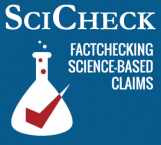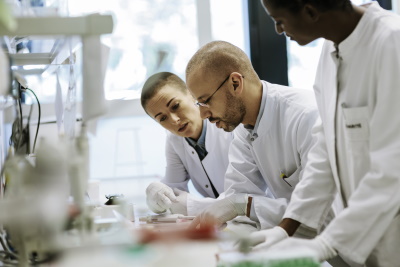What does a fact-checking organization do when the facts aren’t clear? And what happens when reputable scientists disagree about a public health policy?
Throughout the COVID-19 pandemic, there have been numerous examples of when scientific opinion has been divided, at least to some extent, typically because of a lack of robust data. That includes the utility of face masks, particularly before it became clear that the coronavirus could be spread from individuals without symptoms, and the need for healthy people to get booster vaccines.
The latest example occurred last month, when the Food and Drug Administration authorized a second COVID-19 booster, or fourth dose, of the Pfizer/BioNTech and Moderna vaccines for people 50 years of age and older. The decision was cheered by some experts, but criticized by others. It was based on some evidence, but the data was admittedly limited. (For more, read “Q&A on Second COVID-19 Boosters for Older People.”)
Here at SciCheck, we thought we would take the opportunity to explain how we approach such situations and explain our process.
 First, in these cases, we don’t write standard fact checks. Those are reserved for statements politicians or people on social media make that are either inaccurate or misleading in some way.
First, in these cases, we don’t write standard fact checks. Those are reserved for statements politicians or people on social media make that are either inaccurate or misleading in some way.
Given the confusion people might have, though, we think it’s helpful to weigh in and provide accurate information on certain scientific topics. In these cases — and in some others, when there’s little in dispute, but the science might be complicated — we write a Q&A or a background science story to capture what is known about a given topic at that time.
Sometimes, these are fairly straightforward. Take our vaccine pages, which we have for each of the three approved or authorized COVID-19 vaccines, and continue to update with new information. We now have a lot of information about the vaccines, and there’s a very broad and strong consensus among scientists and physicians that the vaccines are safe and effective — and that those who are eligible should get their first doses.
But more often than not, the science isn’t as clear-cut, or we simply don’t have enough information yet to give the kind of answers the public often expects from scientists. “Science,” after all, isn’t a monolith — and despite misconceptions people may have from high school, it’s rarely black and white. It’s nuanced and messy and can get complicated.
That’s when SciCheck tries to make clear what we do know, what we don’t, and if it’s on a controversial subject, why different experts have differing opinions, even after looking at the same set of data. Our approach is to describe the underlying data, and then provide context for why certain scientists either do or don’t find it compelling.
Depending on the topic, we interview scientists with the most relevant expertise, or, if it’s a broader issue, collect views from a variety of experts, such as in our story on second boosters for older people. In that case, immunologists, a public health expert, vaccinologist and practicing geriatrician all had slightly different views, although most of them found the decision to allow people 50 years and older to get a second mRNA shot to be reasonable, if not a bit premature and based on relatively little data, particularly for the youngest eligible people.
As we explained, much of the data supporting the authorization came from Israel, which allowed people 60 years and older to get fourth mRNA shots starting in January. Observational studies comparing outcomes in those who opted to get another booster compared with those who didn’t suggest that the extra dose further lowers the risk of severe COVID-19. But Dr. Paul A. Offit, a pediatrician and vaccine expert at the Children’s Hospital of Philadelphia, didn’t find those studies convincing, since the people who chose to get the additional vaccine might have been more health-conscious. The studies also didn’t have a long follow-up and didn’t include people below the age of 60. Offit, who is on the FDA’s vaccine advisory committee, was upset that the agency didn’t hold a committee meeting to review the evidence before the authorization.

Several other sources were less critical, saying that the authorization gave physicians flexibility, which could be valuable. But they recommended that people try to “time” their doses for when their individual risk is higher, to save the booster’s maximal protection against infection for when it’s needed most.
As we and others have noted before, part of the disagreement about boosters boils down to the goal of vaccination — and whether the aim is to prevent severe disease or whether it also should be to reduce infections and mild illness. That’s relevant because the neutralizing antibodies that protect against infection decline within a few months, but the wider immune response that prevents severe COVID-19 is much more durable. If experts have different ideas of what they want vaccines to do, then they’ll inevitably have different ideas about when boosters should be deployed.
It’s also important to understand that science is not the same as science policy. While good science should underpin and inform public health decisions — the core of President Joe Biden’s vow to “follow the science” — those decisions often need to incorporate practical and psychological considerations about feasibility and how the public will react and respond to that guidance. This can further divide experts, who may have very different views of what Americans can handle in terms of messaging.
The Centers for Disease Control and Prevention and FDA have sometimes explained that those considerations have shaped policy. The FDA, for example, said that it decided to open up second booster eligibility for all people 50 and older — not just people over 60 or those with underlying health conditions — because it “reduces confusion for people.” That information came near the end of a press conference, during an explanation for why the agency did not feel it needed to bring the policy question before its outside vaccine advisory committee.
But too often, officials don’t make or emphasize such acknowledgements. That can undermine public trust in those decisions, especially if there is some evidence that appears to conflict with the new policy, such as when the CDC decided in January that people with COVID-19 could end their isolation after five days instead of 10, even without a negative rapid antigen test. As we wrote, that controversial guidance reflected practicalities, but it would have been better for officials to be upfront about how and why they arrived at that decision.
The best — and arguably most fundamental — part of science is that it is self-correcting and always evolving. More than anything, science is a process, a method for moving closer to truth and a better understanding of our world.
For that reason, SciCheck also tries to be transparent and remind readers that the science on a given topic can change — an important message, given the habit of some to apply today’s knowledge to the past to undermine public health guidance. Already, since we published our article on second boosters, another Israeli study on the effectiveness of fourth mRNA doses has been published, although it hasn’t changed Offit’s mind.
On the flip side, sometimes inconclusive or unlikely events, such as whether certain drugs are effective against the coronavirus, become less likely over time as evidence accumulates against them — and it’s important to share that information, too. When we first wrote about hydroxychloroquine, a malaria pill former President Donald Trump hyped for COVID-19 patients, we explained there was little data to indicate it worked, but left open the possibility that it might — and said that larger randomized controlled trials were needed to find out.
For more than a year, we continued to write about hydroxychloroquine as politicians and others made unfounded statements about it, despite more and more good studies that found it didn’t help people with COVID-19. We handled similar claims about the antiparasitic medication ivermectin in the same way. Several large trials have now failed to find that the drug is beneficial in treating COVID-19, although a few are still ongoing.
What experts do agree on — if they’re reputable — is that we don’t know what the future will hold. As E. John Wherry, a University of Pennsylvania immunologist, told us in a recent interview, “If there’s one thing we’ve learned through this pandemic, it’s to be humble about the virus. And to be very, very careful about making predictions.”
This cautious approach can be hard for people who expect concrete statements. But of course, scientists live for caveats, and so much of science is uncertain. At SciCheck, we will keep reporting on these nuanced topics and provide our readers the best information available at the time.
Editor’s note: FactCheck.org does not accept advertising. We rely on grants and individual donations from people like you. Please consider a donation. Credit card donations may be made through our “Donate” page. If you prefer to give by check, send to: FactCheck.org, Annenberg Public Policy Center, 202 S. 36th St., Philadelphia, PA 19104.